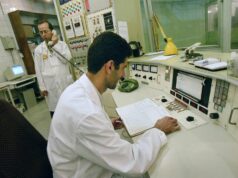US experts want revamp of military command architecture with Japan

A bipartisan group of influential U.S. policy experts on Thursday unveiled a set of proposals to build a “more integrated” partnership between their country and Japan amid a challenging security environment, with one key pillar being a transformation of the decades-old alliance’s command-and-control architecture.
A report released by the group, co-chaired by former Deputy Secretary of State Richard Armitage and Joseph Nye, a former assistant secretary of defense for international security affairs, highlighted that both Japan’s role in the international community and its alliance with the United States have become more important than ever.
Citing China’s rising assertive presence across Asia and beyond, North Korea’s relentless quest to develop its nuclear and missile capabilities, Russia’s invasion of Ukraine and rekindled tensions in the Middle East, the authors argued that the world is “more fragmented and divided than at any time since the end of World War II.”
Under such circumstances, they proposed the United States and Japan “take the next step” to work toward “an alliance that is more integrated, from planning and executing military operations to linking economic and security concerns, including by coordinating industrial policy and promoting secure supply chains.”
As part of this endeavor, they said the United States should upgrade the leadership of its forces in Japan by “establishing a standing three- or four-star joint operational command, subordinate to U.S. Indo-Pacific Command, with a more robust staff and the authority to plan and execute bilateral exercises and operations.”
The group under the nonprofit Center for Strategic and International Studies said the two countries should then set up a bilateral office to assist with closer coordination and minimize seams between the structures of the forces, which would maintain separate chains of command.
The report was released days before a meeting between U.S. President Joe Biden and Japanese Prime Minister Fumio Kishida in Washington, during which they are expected to discuss the topic in conjunction with Japan’s planned setup of a joint headquarters to command its ground, maritime and air forces by March 2025.
Noting that doubts about the future of U.S. leadership in global affairs persist, especially with the presidential election looming in November, the experts said, “The burdens of global and regional leadership will therefore fall more heavily on Tokyo in the near term” but it is “well positioned to take on this role.”
To modernize the alliance, they said Japan needs to step up efforts to improve cybersecurity practices, and centralize its intelligence gathering and analytical functions.
Among other proposals, the so-called Armitage-Nye report encouraged the United States and Japan to continue bolstering ties with like-minded partners, such as Australia, the Philippines, South Korea and Taiwan, and advancing economic cooperation.
Aside from taking effective and collective steps to deal with China’s support of domestic industry via massive subsidies as well as strengthening supply chains of key materials, the authors recommended that the United States and Japan consider expanding the Group of Seven to include Australia and South Korea.
The report concluded with one warning for the alliance’s future, saying it is imperative to stem a recent dramatic decline in the number of U.S. and Japanese studying in each other’s country.
“It is the enduring task of both countries to cultivate new generations of leaders who recognize the value of the two countries’ partnership and who share a commitment to sustaining it,” the group said.
The report is the sixth of its kind evaluating the state of the bilateral relationship, with the initial version having been issued in 2000 ahead of the U.S. presidential election in a bid to offer a vision for an improved alliance between Washington and Tokyo irrespective of which candidate won.
The previous paper, issued four years ago before Biden’s inauguration, called for an alliance that is “more equal” to deal with critical issues, be they bilateral or otherwise.



